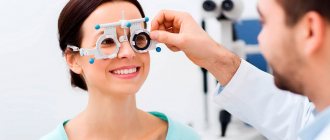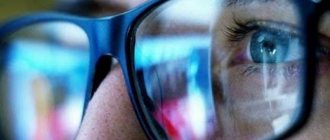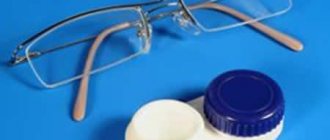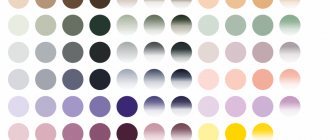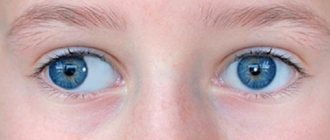Human vision is one of the great gifts of nature that must be protected. Unfortunately, we do not think about our eyes and their condition until our vision begins to bring significant discomfort into our lives. But even when visual functions of the eye worsen, we also continue to ignore the condition of our eyes. Decreased visual function of the eyes indicates that need to wear glasses, this is a direct indication.
For many years, the attitude towards glasses was negative, this was formed by the attitude of society, and since vision problems often arise in childhood or adolescence, it was this age category that shaped the attitude towards glasses, which, unfortunately, was not very positive. Children who have to wear glasses find it extremely difficult to be in the company of their peers, because this accessory makes them stand out, which makes them the subject of discussion and ridicule. Has the situation changed in the 21st century? No, it hasn't changed.
Those whose children refuse to wear glasses even in class know this very well. Children, by the way, especially small ones, do not even hide this problem, so parents whose children are forced to wear glasses should pay attention to this. You need to talk to children, you don’t need to scold them for not refusing to wear glasses.
The need for glasses needs to be explained to children, this should be done very delicately, remember that children are very impressionable, they multiply and embellish everything, this, by the way, does not relate to the problem of ridicule, on the contrary, in this case they will not finish telling, exaggerating the existing problem. This happens due to the active pressure of the parents on the child, such a response from the child is a defensive reaction of the child, or rather his psyche. That’s why, dear parents, don’t put pressure on your baby, do it carefully!
In the future, this problem persists, it does not go away, and at a more mature age a person also refuses to wear glasses, due to a psychological barrier formed at an early age. Only as adults do we find excuses such as “it’s inconvenient”, “the glasses get sweaty in the cold”, “they keep falling off”, etc. But all these are just excuses, behind which a serious psychological problem is hidden, while the person understands perfectly well that he needs glasses. Here you need to work with psychologists.
You may be interested in The truth about discounts on glasses and spectacle lenses
This problem should be solved already at the stage of its formation, that is, in childhood or adolescence. But in order to talk to a child and explain to him the need for glasses, you must first figure out for yourself when to wear glasses, and that’s what we’ll talk about in this article.
Assignment of points
Glasses are a device that can be used to correct various refractive errors, strabismus, to protect the eyes from industrial dust, sparks, chips, and to reduce the negative effects of ultraviolet radiation on the eyes. The frames of glasses can be equipped with lenses with diopters, durable polycarbonate lenses, ordinary transparent or colored glasses, and protective lenses with a high level of absorption of UV rays.
Purpose of glasses:
- correction of myopia, farsightedness, astigmatism;
- correction of strabismus;
- eye protection while working with an angle grinder, welding machine, etc.
- glasses for sports protect from wind, dust, sun;
- eye protection while playing airsoft, shooting (ballistic glasses);
- sun protection accessories;
- designer accessories with zero diopters - used to complement individual style.
The primary purpose of any glasses is to make a person’s life more comfortable and safer. In glasses with prescription lenses, a person sees the world around him without distortion, can drive a car, see an obstacle on the road in a timely manner, and respond to a threat. Glasses that protect from sun rays are also of great benefit. Ultraviolet rays, both in summer and during sunny and snowy days in winter, can negatively affect the condition of the retina. After prolonged exposure to the sun, the eyes may begin to water, sharp pain in the eyeballs and intolerance to bright light appear.
As you can see, the benefits of optics, if used as intended, are considerable, but still the question of whether glasses can cause harm when worn for a long time remains open. It all depends on the purpose of use. If it is vision-correcting optics, then you must follow the recommendations of an ophthalmologist; if it is a sun protection accessory, then the time it can be worn is still limited. How do you still need to wear glasses for vision and protection from the sun so that they do not harm your health?
Are glasses harmful to your eyesight?
Doctors, in most cases when a patient needs vision correction, insist on constantly wearing glasses. Is this really necessary and can optics, with constant use, harm eye health? The fact is that glasses are worn for vision not because they treat ophthalmological disorders, but for correction, therefore, if permanent correction is indicated, the doctor’s recommendations must be followed. If, with a high degree of myopia, optics are used irregularly, then the person’s eyes will be subject to increased stress, as they will have to be overstrained due to unacceptable optical conditions. Due to overexertion, a spasm of accommodation may occur and vision will decrease by several more diopters. In this case, wearing glasses irregularly will cause real harm.
When glasses can damage your vision:
- the optical power of the lenses is incorrectly selected;
- wearing optics with smaller diopters than required by correction;
- non-compliance with the recommendations of the ophthalmologist.
Is it harmful to wear glasses? Can they weaken your vision? Typically, the reason for the progression of an ophthalmological problem is not in corrective optics, but in weakened immunity, chronic and systemic diseases, and patient disturbances in sleep, rest, and visual stress. Glasses themselves cannot weaken vision, since they are just a device that creates optimal optical conditions. Why do many people feel that they need glasses correction more? There are several simple explanations for this:
- vision is better with glasses, and constant correction forms a person’s habit of getting a high-quality picture;
- the lack of correction causes discomfort, as it is difficult for the brain to process distorted information;
- Evening eye fatigue and blurred vision are often attributed to the negative effects of glasses, but such fatigue is also observed in people with good vision.
It is especially important to wear properly fitted glasses for children, as insufficient correction can lead to amblyopia, a condition in which the brain stops receiving information from the weaker eye. Adults also need correction of ophthalmological disorders. A number of studies conducted by different groups of scientists suggest that glasses cannot worsen vision. The harmful effects of glasses have not yet been proven.
How does a person see with refractive errors and indications for glasses
The reason for the occurrence of refractive errors lies in the individual structure of the eyeball, which is formed during the period of conception and is formed from birth to 21 years.
You may be interested in the history of glasses
Let's look at how a person perceives objects in the presence of refractive errors.
For nearsightedness (myopia)
Myopia means near the hand, that is, when they say that a person is myopic, this means that he sees objects well near and poorly at a distance. The further away an object is, the worse a person sees it. Myopia is the strongest refraction, which means that excessive (strong) refraction of rays occurs. In this case, the rays are collected at one point in front of the retina.
For farsightedness (hypermetropia)
Farsightedness means further than the hand, in other words, a farsighted person sees objects well in the distance and poorly at close distances. This occurs due to insufficient refraction of the rays, so they converge at one point behind the retina. “Behind the retina” is a relative concept; of course, this point does not exist; it is used to explain the process.
For astigmatism
With astigmatism, a person not only sees poorly, but the object in question tends to split in two and blur. With astigmatism, the rays are not concentrated at one point.
- When this occurs in front of the retina, astigmatism is called myopic. - When this occurs behind the retina, astigmatism is called hypermetropic. - In addition, they can simultaneously be in front of the retina and behind it; such astigmatism is called mixed.
For presbyopia
Presbyopia is the same farsightedness, only developing with age; a person sees in the same way as with normal farsightedness.
Do I need to wear glasses all the time if I have a slight degree of myopia?
Minor refractive errors, for which lenses with small diopters are recommended, are subject to inconsistent correction. For example, children may only need glasses for distance vision and when watching TV, reading from the board, etc., but they do not need glasses to work with written assignments in a notebook. Typically, such recommendations are always specified by the ophthalmologist. People with myopia should follow the prescribed glasses wearing regimen to prevent eye strain.
It is worth noting that if refractive error is combined with astigmatism or strabismus, then even with the initial degree of myopia, constant wearing of glasses or contact lenses may be recommended. To ensure that myopia does not progress and is not complicated by a spasm of accommodation, doctors advise strengthening the ciliary muscle by performing useful exercises daily, choosing appropriate visual gymnastics.
Selecting distance glasses
The choice of vision correction should be approached responsibly. Before purchasing, consult an ophthalmologist for diagnostics. At a doctor's appointment, the optical power and the presence or absence of astigmatism are determined.
The ophthalmologist will write a prescription, since the correct selection of glasses requires knowing the distance between the pupils.
The first step is choosing lenses. In the optics salon, the seller will offer suitable products; you can purchase models with additional coating. Drivers will need anti-glare; it eliminates glare. Tinted glasses protect against UV radiation.
The second step is choosing a frame. You should focus on the quality of the frame and a comfortable fit on the bridge of your nose. The temples should not put pressure on the temple area, cause any discomfort or dangle.
It is advisable to buy models with adjustable nose pads. Such a product will not put pressure on the bridge of the nose or leave red marks. Nose pads should not be hard.
The frame material depends on the thickness of the lens. He must endure. Near glasses can be purchased without frames, if the degree of refractive error is insignificant and the lens is thin, the mounting screws will hold up.
Ready-made glasses are not the best option for any refractive error. They are manufactured according to the same standard; the individual characteristics of a particular person are not taken into account. The centering may be changed in them, and a shift in focus can be dangerous for vision.
Adults can afford to experiment, choose the right frames and make their eyes more expressive. For children, it is more important that the model sits anatomically correctly on the face. This is a problem, especially for children under 4 years old. Choose light frames so as not to cause discomfort
Glasses without diopters - risks of constant wearing
A huge selection of stylish, colorful frames attracts the attention of even people with good eyesight to this accessory. Wearing glasses changes a person's appearance dramatically and many use them to look more respectable, business-like or trendy and modern. Are there any risks to eye health for such people? Do glasses without prescriptions harm your eyesight?
When worn for up to two to three hours a day, glasses with plain lenses will not cause harm. But it is worth remembering that through such an accessory a person looks straight, and because of this, the eye muscles may relax somewhat. Therefore, such wearing cannot be called completely safe.
Moreover, you should not wear glasses without diopters all the time, because glass is still a hindrance, dust accumulates on it, there may be stains, etc., which impairs visibility and forces the organs of vision to strain more than necessary. Eye strain is fraught with the development of real pathologies in the form of a spasm of accommodation, which is quite difficult to treat and requires constant therapeutic procedures.
Rules for wearing glasses
It must be remembered that using someone else's glasses or purchasing corrective optics without a doctor's prescription leads to the development of even more serious visual impairments. Properly selected lenses in some cases help eliminate existing visual deviations and prevent severe visual disorders.
People who have been prescribed glasses should know several important rules regarding their correct wearing:
- The distance between the glasses and the eyes when wearing glasses should be 12 mm. An increase in the specified distance leads to a change in the optical effect of the lenses.
- Eyeglass lenses should always be clean. Any dirt on their surface contributes to poor vision and eye fatigue.
- During the first 10-14 days of wearing new glasses, you may experience discomfort associated with a feeling of changing shapes and sizes of objects. This effect will subside over time, but if the discomfort is of concern, it is recommended that you make a follow-up visit to your eye doctor.
- People with myopia less than 3 diopters should not engage in reading or other types of visual work at a distance of less than 30-50 cm.
- People with progressive myopia above 6 diopters need to wear glasses at all times. In this case, the ophthalmologist impregnates such patients with 2 pairs of glasses: strong ones for long distances, and weaker ones for near distances. The duration of visual stress should not exceed 4-5 hours a day. You should give your eyes a rest every 40 minutes.
- If you have severe visual impairment, changing places with different lighting conditions may temporarily impair your vision with new glasses. Therefore, when leaving a dark room outside, you must be careful.
Can I wear sunglasses for a long time?
Human eyes can adapt to different lighting conditions. We see normally at dusk, we can navigate in space at night, and in order to prevent a large amount of sunlight from hitting the retina, our pupils can narrow.
Nature has thought out everything that a person needs down to the smallest detail. But in extreme conditions, for example, when the sun's rays are reflected from the water surface or snow, sunglasses are really necessary.
Also, a sun protection accessory is needed in the hot season and in a metropolis. It allows your eyes to relax and not squint from the sun and glare. With glasses, the eyes are not visible to others, so this accessory is often used when you need to hide fatigue. In addition, the variety of designs of sun protection optics opens up new opportunities for those who like to always look stylish and original. Since sunglasses are part of their image, many people start wearing them without taking them off for several hours. What could this lead to?
Risks of wearing sun protection optics for a long time:
- intolerance to bright light - if you wear sunglasses for more than three to four hours in a row, photophobia may develop with unpleasant symptoms such as watery eyes and pain in the eyeballs;
- visual impairment - the risk of such a problem increases when wearing low-quality optics, without a special protective coating;
- eye fatigue - this symptom often occurs when wearing sun-protective optics with gradient shading that is now fashionable (use this model not all the time, but only to complement the style during photo shoots, at a party, etc.);
- deterioration of well-being - colored lenses, especially red and yellow, can cause dizziness, as they greatly distort the usual colors and provoke eye fatigue.
Depending on the purpose of the glasses, they must be worn in accordance with the recommendations of the doctor or the optical manufacturer, also focusing on generally accepted rules that relate to the operating mode of such products. Eyeglasses or sunglasses will not harm your health if you strictly follow the recommended wearing standards.



